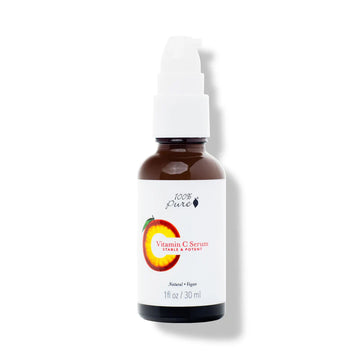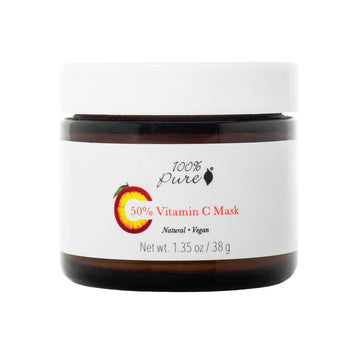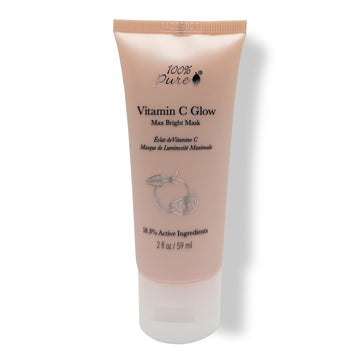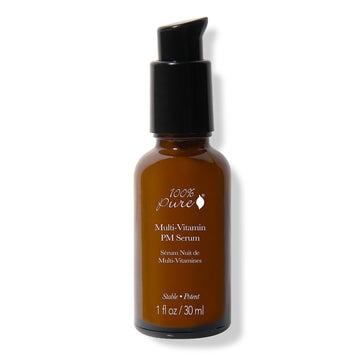Understanding How Vitamin C Transforms Your Skin
Written by: 100% PURE®
When it comes to skincare, the plethora of products and ingredients available in the market can be overwhelming. Serums, toners, creams, and more – each boasting their unique ingredients promising to restore, rejuvenate, and revitalize our skin. Among the myriad of ingredients, one stands out not just for its popularity, but for its proven efficacy: Vitamin C.
Vitamin C is not just the nutrient we seek to ward off colds or boost our immune system. In the realm of skincare, it is celebrated for its potent antioxidant properties that counteract the damaging effects of free radicals, thereby playing a pivotal role in maintaining the skin's health and youthful vigor.
Vitamin C plays a transformative role in achieving radiant, youthful, and healthy skin. This article will delve into the many ways this essential vitamin aids in skincare, solidifying its status as a must-have in every skincare routine.
Vitamin C, scientifically known as ascorbic acid, is a water-soluble vitamin that plays a vital role in the maintenance of good health. Our bodies cannot produce this essential nutrient on their own, so we must obtain it through our diet or supplements. Found naturally in foods such as citrus fruits, strawberries, bell peppers, and broccoli, this antioxidant vitamin is crucial for a variety of bodily functions.
In the context of the body, Vitamin C is paramount for collagen synthesis, iron absorption, and immune function. When it comes to skin, its antioxidant properties help to defend against harmful free radicals—unstable molecules that can damage our cells, including skin cells. By combating these free radicals, Vitamin C aids in preventing premature aging and promotes a radiant complexion.
Commonly found in serums, it offers targeted benefits like skin brightening and texture improvement. Vitamin C-infused creams maintain skin hydration and provide antioxidant protection, while masks offer intensive treatments for occasional use. Some sunscreens integrate Vitamin C to enhance sun protection and counteract UV-induced free radicals. Toners and mists containing Vitamin C balance skin pH and add rejuvenation. When choosing Vitamin C products, it's vital to consider skin type and ensure packaging protects against degradation from light and air.

Vitamin C, also known as ascorbic acid, has long been celebrated for its numerous health benefits, particularly its role in bolstering the immune system. However, its skin-enhancing qualities deserve equal acclaim. Packed with antioxidant properties, Vitamin C not only revitalizes our internal health but also offers a multitude of benefits for our skin. Here's a deep dive into the manifold advantages of this vital nutrient for the skin:
Boosting Collagen Production
Overview: Collagen, a naturally occurring protein in our body, provides our skin with structure and elasticity. As we age, collagen production decreases, leading to wrinkles and fine lines. Vitamin C plays a pivotal role in promoting collagen synthesis, thereby maintaining the skin’s youthful texture.
Scientific Backing: Numerous studies have confirmed Vitamin C's role in enhancing collagen production. One such study published in the journal Nutrients highlights that ascorbic acid actively contributes to collagen biosynthesis and supports cellular functions of both dermal fibroblasts and keratinocytes.
Brightening Skin Tone
Overview: A radiant complexion is a universal sign of healthy skin. Vitamin C has been touted for its ability to brighten and even out skin tone by reducing the appearance of dullness.
Scientific Backing: Its brightening property stems from its ability to inhibit melanin production in the skin. Research indicates that Vitamin C can help decrease melanin formation, thereby reducing the appearance of dark spots and achieving a more illuminated complexion.
Reducing Hyperpigmentation
Overview: Hyperpigmentation, characterized by dark patches on the skin, can result from a myriad of factors, including sun exposure, hormonal changes, and inflammation. Vitamin C intervenes by targeting the root of pigmentation production.
Scientific Backing: A study in the Journal of Clinical and Aesthetic Dermatology showcased that topical ascorbic acid application can lead to a significant reduction in melanin synthesis, aiding in the reduction of pigmented spots.
Protecting Against Environmental Damage
Overview: Daily exposure to UV rays and pollution can accelerate skin aging. Vitamin C serves as a shield, protecting skin cells from harmful free radicals and oxidative stress induced by these environmental aggressors.
Scientific Backing: The antioxidative properties of Vitamin C are well-documented in scientific literature. According to the Journal of Investigative Dermatology, Vitamin C neutralizes oxidative stress caused by exposure to UV rays and pollutants, thereby preventing premature skin aging and potential damage.
Vitamin C, revered for its antioxidant properties and role in collagen synthesis, has garnered significant attention in the realm of skincare. To reap the full benefits of this powerhouse ingredient, it's crucial to use Vitamin C products correctly. Here's a comprehensive guide on seamlessly integrating Vitamin C into your skincare routine for optimal results.
1. Choose the Right Product
- Serums: A Vitamin C serum is one of the most potent ways to deliver the vitamin to your skin. Look for serums with L-ascorbic acid, the most effective form of Vitamin C, listed among the top ingredients.
- Moisturizers: Some moisturizers are enriched with Vitamin C. These can be ideal for those looking for milder Vitamin C effects or to supplement the benefits of a serum.
- Sunscreen: Some sunscreens include Vitamin C to boost their antioxidant protection against UV rays.
2. Start Slowly
Vitamin C can be potent. If you're new to it, start with a product containing a lower concentration (around 10%) to see how your skin responds. After a few weeks, you can graduate to products with higher percentages, if needed.
3. Optimal Application Time: Morning vs. Night
- Morning: Vitamin C is an antioxidant, making it ideal for daytime use. It fights free radicals from environmental pollutants and UV radiation, offering a protective barrier. Using Vitamin C in the morning, followed by sunscreen, can amplify your sun protection.
- Night: While Vitamin C is highly effective in the morning, it's also beneficial at night when skin repair is in full swing. Using it in the evening can aid the skin's natural healing process. If you're using retinol in your nighttime routine, it's essential to ensure the two ingredients are compatible or consider alternating nights.
4. The Ideal Order in Your Skincare Routine:
- Cleanse: Begin with a gentle cleanser to ensure your skin is free from dirt and makeup.
- Tone: If you use a toner, apply it next. Toners can help balance the skin's pH and prepare it for subsequent products.
- Vitamin C: Apply your Vitamin C product, whether it's a serum or moisturizer. Using it early in your routine ensures maximum absorption.
- Hydration: If you're using a Vitamin C serum, follow with a moisturizer to lock in hydration.
- Sun Protection: In the morning, always finish with a broad-spectrum SPF. If your sunscreen doesn't contain Vitamin C, applying it after a Vitamin C serum can give an added boost against free radicals.
Newsletter Subscribe
for more blog updates and exclusive discounts
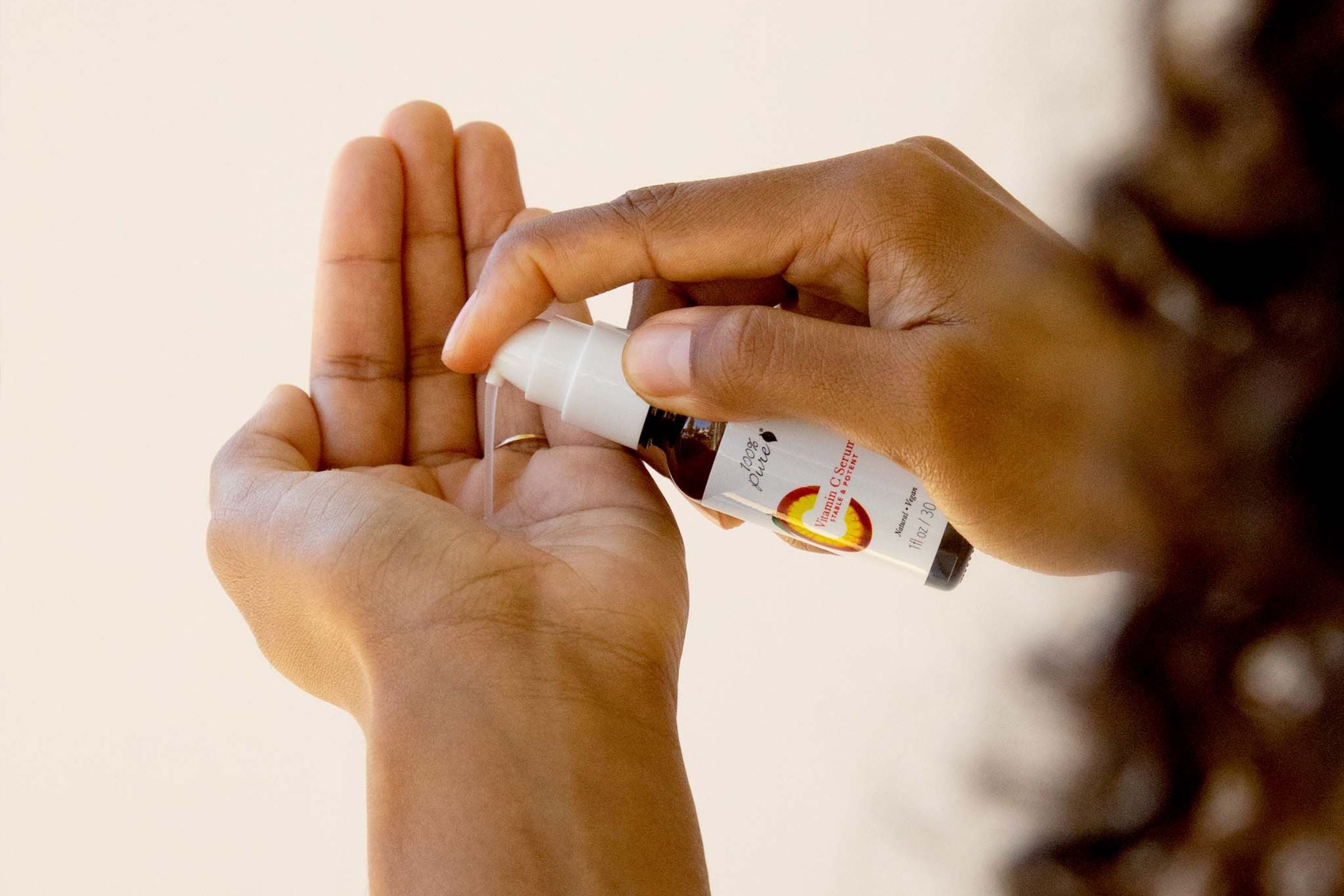
Given its multifaceted advantages, many beauty enthusiasts seek out top-rated Vitamin C products. Let's delve into some of the best offerings that are 100% PURE:
Vitamin C Serum
This lightweight serum, stabilized with Vitamin C, boasts a hydrating aloe gel base that not only soothes the skin but also deeply nourishes it. Tailored for vegan skincare enthusiasts, this natural serum is a powerhouse in promoting collagen production — essential for maintaining skin's elasticity and firmness. The infusion of green apple and grape enhances the skin's radiance. Furthermore, the addition of alpha lipoic acid (ALA) acts as a shield against oxidative damage, a common culprit for premature skin aging and discoloration.
Vitamin C Mask
Envision a mask that brightens your skin, packed with a concentrated dose of vitamin C. This product does just that, and goes a step further by supporting collagen and elastin production, ensuring enhanced firmness and elasticity. With ingredients like fruit enzymes, beet lactic acid, and fermented rice kojic acid, this mask gently exfoliates, revealing an even skin tone and diminishing dark age spots. Its primary goal is to revitalize, leaving your skin with a vibrant glow after every application.
18.3% Active Ingredients Vitamin C Glow Max Bright Mask
A transformative product, this mask promises noticeable skin rejuvenation from the very first use. Rich in Vitamin C, it also incorporates age-correcting elements like Bakuchiol, CoQ10, and Vitamin E. Together, these ingredients work to drastically brighten the skin, enhance collagen production, and improve elasticity. Not stopping there, this mask is also adept at reducing the appearance of lines and wrinkles, while providing deep moisturization and softness.
Multi-Vitamin + Antioxidants Potent PM Serum
This potent night serum is a synergy of stabilized vitamins designed to reduce the appearance of fine lines and wrinkles. Moreover, it aims to enhance firmness, brighten, and even out the skin tone. What sets it apart is the unique formulation of Niacinamide and Vitamin C — two celebrated anti-aging ingredients. While they are usually not combined due to differing pH levels, this serum uses Magnesium Ascorbyl Phosphate. This high-quality, stable form of Vitamin C has a pH balance of 6, which is identical to Niacinamide. This harmony allows the two vitamins to work cohesively, ensuring a restored youthful, and glowing complexion.
Can I use Vitamin C with other active ingredients?
Yes, Vitamin C can be used with many other active ingredients. For instance, it pairs well with hyaluronic acid, peptides, and ferulic acid. However, care should be taken when combining Vitamin C with certain actives like retinol or alpha hydroxy acids, as this can increase skin sensitivity. Always do a patch test or consult with a dermatologist when introducing multiple actives into your routine.
Can I use Vitamin C during the day?
Absolutely! Vitamin C is an excellent daytime active because of its antioxidant properties, which help defend the skin against damage from free radicals and UV radiation. However, if you're using Vitamin C during the day, always follow up with sunscreen to maximize protection against sun damage.
How long does it take to see results from Vitamin C?
The time frame can vary based on the individual and the concentration of Vitamin C in the product. Generally, with daily use, noticeable results like improved skin brightness and reduced dark spots might be seen in as little as 2-4 weeks. For significant changes, such as reduced fine lines, it might take several months.
Can Vitamin C cause skin sensitivity?
For some individuals, Vitamin C can cause skin sensitivity, especially in higher concentrations. Common reactions include redness, itching, or a tingling sensation. If you're new to Vitamin C, it's a good idea to start with a lower concentration and gradually work your way up. If you experience irritation, consider reducing the frequency of application or choosing a product with a lower concentration.
Is there any difference between various forms of Vitamin C in skincare products?
Yes, there are multiple forms of Vitamin C used in skin care, including L-ascorbic acid, magnesium ascorbyl phosphate, and ascorbyl palmitate, among others. L-ascorbic acid is the most potent form but can be more irritating and unstable. Other forms are more stable and may be less irritating but could be less potent. The best form often depends on individual skin type and needs.
Given this plethora of advantages, it's no surprise that Vitamin C has gained a reputable standing in skincare routines around the globe. The diverse range of Vitamin C products available today – from serums and moisturizers to face masks – stands as a testament to its multifaceted benefits.
For those of you who have yet to integrate Vitamin C into your daily skincare regimen, consider this your invitation. Explore the multitude of Vitamin C-infused products available in the market. Whether you’re combating signs of aging, looking to enhance skin radiance, or merely fortifying your skin's natural defenses, there's likely a Vitamin C product waiting to enrich your skincare journey.
Here's to radiant, healthy skin, and the power of Vitamin C!
- Tags: August-2023, Skin Care, skincare
We carefully hand-select products based on strict purity standards, and only recommend products we feel meet this criteria. 100% PURE™ may earn a small commission for products purchased through affiliate links.
The information in this article is for educational use, and not intended to substitute professional medical advice, diagnosis, or treatment and should not be used as such.



